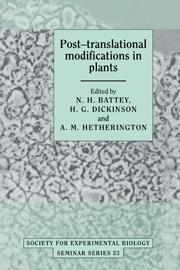Book contents
- Frontmatter
- Contents
- List of contributors
- List of abbreviations
- Preface
- Some roles of post-translational modifications in plants
- Signal transduction and protein phosphorylation in bacteria
- Roles of protein phosphorylation in animal cells
- The significance of post-translational modification of proteins by phosphorylation in the regulation of plant development and metabolism
- Post-translational modification of chloroplast proteins and the regulation of protein turnover
- Purification of a small phosphoprotein from chloroplasts and characterisation of its phosphoryl group
- Use of synthetic peptides to study G proteins and protein kinases within plant cells
- Activation of membrane-associated protein kinase by lipids, its substrates, and its function in signal transduction
- Distribution and function of Ca2+-dependent, calmodulin-independent protein kinases
- Phosphorylation of the plasma membrane proton pump
- The regulation of phosphoenolpyruvate carboxylase by reversible phosphorylation
- Protein phosphorylation and circadian rhythms
- Control of translation by phosphorylation of mRNP proteins in Fucus and Xenopus
- Regulation of plant metabolism by reversible protein (serine/threonine) phosphorylation
- Detection, biosynthesis and some functions of glycans N-linked to plant secreted proteins
- Biosynthesis, intracellular transport and processing of ricin
- Post-translational processing of concanavalin A
- The role of cell surface glycoproteins in differentiation and morphogenesis
- Ubiquitination of proteins during floral development and senescence
- Index
Preface
Published online by Cambridge University Press: 06 July 2010
- Frontmatter
- Contents
- List of contributors
- List of abbreviations
- Preface
- Some roles of post-translational modifications in plants
- Signal transduction and protein phosphorylation in bacteria
- Roles of protein phosphorylation in animal cells
- The significance of post-translational modification of proteins by phosphorylation in the regulation of plant development and metabolism
- Post-translational modification of chloroplast proteins and the regulation of protein turnover
- Purification of a small phosphoprotein from chloroplasts and characterisation of its phosphoryl group
- Use of synthetic peptides to study G proteins and protein kinases within plant cells
- Activation of membrane-associated protein kinase by lipids, its substrates, and its function in signal transduction
- Distribution and function of Ca2+-dependent, calmodulin-independent protein kinases
- Phosphorylation of the plasma membrane proton pump
- The regulation of phosphoenolpyruvate carboxylase by reversible phosphorylation
- Protein phosphorylation and circadian rhythms
- Control of translation by phosphorylation of mRNP proteins in Fucus and Xenopus
- Regulation of plant metabolism by reversible protein (serine/threonine) phosphorylation
- Detection, biosynthesis and some functions of glycans N-linked to plant secreted proteins
- Biosynthesis, intracellular transport and processing of ricin
- Post-translational processing of concanavalin A
- The role of cell surface glycoproteins in differentiation and morphogenesis
- Ubiquitination of proteins during floral development and senescence
- Index
Summary
The papers collected in this volume are the contributions of invited speakers to a two-day meeting organised by the Plant Development and Plant Metabolism groups of the SEB and held at Lancaster in April 1992. One of the ideas of the meeting was to try and get away from the stereotyped divisions of ‘hormones and receptors’, ‘signal transduction’, ‘Golgi transport’, ‘protein targeting’, and so on, and look instead at things from the point of view of the proteins involved in these processes, and the effects of post-translational modifications on their activity. The result is a selection of papers on phosphorylation, glycosylation, acylation, ubiquitination, and protein processing, which illustrate the ways in which these modifications are brought about and their effects on cellular processes.
The first chapter, by the volume editors, is an introductory overview of the subject of post-translational modification in plants, in which key advances in the last few years are highlighted. The following chapters by Dixon and Hardie place the work on plant systems in a wider context by reviewing the roles of protein phosphorylation in bacteria and animals; Fallon & Trewavas provide a general discussion of phosphorylation in plant cells and some details on Ca2+/calmodulin regulated and tyrosine kinases in plant systems. In the chapters by Mattoo et al., Soll, and White et al., phosphorylation is discussed with particular reference to chloroplast function; the uses of peptides in the study of G proteins and chloroplast protein kinase are outlined.
- Type
- Chapter
- Information
- Post-translational Modifications in Plants , pp. xix - xxPublisher: Cambridge University PressPrint publication year: 1993



